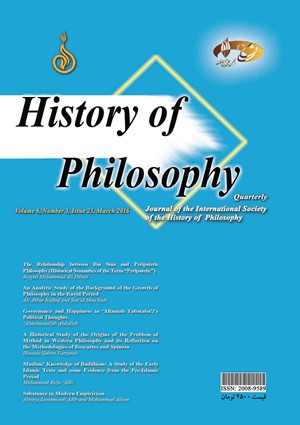The Relationship between Ibn Sina and Peripatetic Philosophy (Historical Semantics of the Term “Peripatetic”)
Subject Areas : Etymology of philosophical terms
1 - پردیس فارابی
Keywords: Ibn Sina Peripatetic philosophy Peripatetic philosophers Aristotle Oriental wisdom,
Abstract :
The term Peripatetic is used in contemporary philosophical literature to exclusively refer to the philosophical method of Aristotle, his followers, Ibn Sina, and a number of Muslim philosophers. On the other hand, Ibn Sina himself, who is considered to be the leader of Peripatetic philosophers among Muslims, has advanced certain harsh criticisms against Peripatetics and denounced them. Presently, the questions that arise in this regard are as follows: Has Ibn Sina criticized Aristotle or his followers? If his criticism of Peripatetics are not related to Aristotle, does it equally target the Greek, Alexandrian, and Roman advocates of this school and the Peripatetics of Baghdad during the Islamic Period? Can we consider his criticism of the Peripatetics to be a reason for his deviation from the Peripatetic philosophy and turning to a kind of Oriental wisdom? In the present paper, while providing a historical and semantic review of the word “Peripatetic”, the author argues that three groups of Peripatetics (friends of Lyceum, Peripatetics of the third to sixth centuries, and the friends of the House of Wisdom) can be identified in the history of philosophy. Ibn Sina criticizes all the three groups, particularly the third one. Moreover, in his view, one can remove all the defects of the Peripatetic philosophy and then define its modified version in a way that everyone not only accepts it but also pays attention to and emphasizes it. This can be a good strategy for justifying the essence of his Oriental wisdom.
آقاياني چاوشي، جعفر، کتابشناسي توصيفي فارابي، مقدمه ژان ژوليوه، تهران، انتشارات هرمس، 1383.#
ابراهيمي ديناني، غلامحسين، درخشش ابنرشد در حکمت مشاء، تهران، طرح نو، 1384.#
ابنسينا، منطق المشرقيين، قم، کتابخانه آيتالله مرعشي، 1405.ق.#
ابنسينا، السيره، در: مقدمه النجاة، تصحيح ماجد فخري، بيروت، دارالافاق الجديده، بيروت، 1405.ق.#
ابنسينا، المباحثات، تحقيق محسن بيدارفر، قم، انتشارات بيدار، 1371.#
استيس، والترترنس، تاريخ انتقادي فلسفه يونان، ترجمه يوسف شاقول، قم، دانشگاه مفيد، چ2، 1385.#
بدوي، عبدالرحمن، ارسطو عندالعرب، الكويت، وکاله المطبوعات، 1987.م.#
توحيدي، ابوحيان، المقابسات، تحقيق توفيق حسن، بغداد، الارشاد، 1970.م.#
الجابري، محمدعابد، ابنرشد سيره و فکر دراسه و نصوص، بيروت، مرکز دراسات الوحده المربيه، چ2، 2001.م.#
جمالپور، بهرام، «كندي مؤسس حكمت مشاء در اسلام»، مجله دانشکده علوم انساني دانشگاه تهران، ش 101- 104، پاييز1362.#
داوري اردکاني، رضا، نگاهي ديگر به تاريخ فلسفه اسلامي، دانشگاه تهران، 1387.#
دبور، ت. ج، تاريخ فلسفه در اسلام، ترجمه عباس شوقي، تهران، مؤسسه عطايي، 1362.#
دورانت، ويل، تاريخ فلسفه، ترجمه عباس زرياب، تهران، انتشارات علمي و فرهنگي، چ3، 1373.#
صفا، ذبيحالله، تاريخ علوم عقلي در تمدن اسلامي، دانشگاه تهران، ج1، چ5، 1374.#
صفا، ذبيحالله، جشننامه ابنسينا، انجمن مفاخر، ج1، چ2، 1384.#
فارابي، ابونصر، رساله الجمع بين رأيي الحکيمين، در: رسائل فلسفي، ترجمه سعيد رحيميان، تهران، انتشارات علمي و فرهنگي، 1378.#
فارابي، ابونصر، شرح رساله زنون کبير، در: رسائل فلسفي، ترجمه سعيد رحيميان، تهران، انتشارات علمي و فرهنگي، 1387.#
کاپلستون، فردريک، تاريخ فلسفه، ترجمه سيدجلالالدين مجتبوي، تهران، انتشارات سروش و علمي و فرهنگي، ج1، 1368.#
کاپلستون، فردريک، تاريخ فلسفه، ترجمه ابراهيم دادجو، تهران، انتشارات علمي و فرهنگي، ج2، 1387.#
گوتاس، ديميتري، تفكر يوناني، فرهنگ عربي، نهضت ترجمه كتابهاي يوناني به عربي در بغداد و جامعه آغازين عباسي، ترجمه محمد سعيد حنايي كاشاني، تهران، مركز نشر دانشگاهي، 1381.#
نوسباوم، مارتا، ارسطو، ترجمه عزتالهه فولادوند، تهران، نشر طرح نو، چ1، 1374.#
وات، مونتگمري، فلسفه و کلام اسلامي، ترجمه ابوالفضل عزتي، تهران، انتشارات علمي و فرهنگي، 1370.#
هالينگ ديل، ر. ج، مباني و تاريخ فلسفه غرب، ترجمه عبدالحسين آذرنگ، کيهان، 1364.#
Martin.C.F.J., “Medieval Philosophy” in The Blackwell Companion to Philosophy, edited by Nicholas Bunnin and Tsui-James, Oxford, UK, 1996.#
Michael, E., Marmura, “Avicenna”, in The Encyclopediaof Philosophy, Paul Edward, MacMilan Publishing, vol.1. 1972.#


